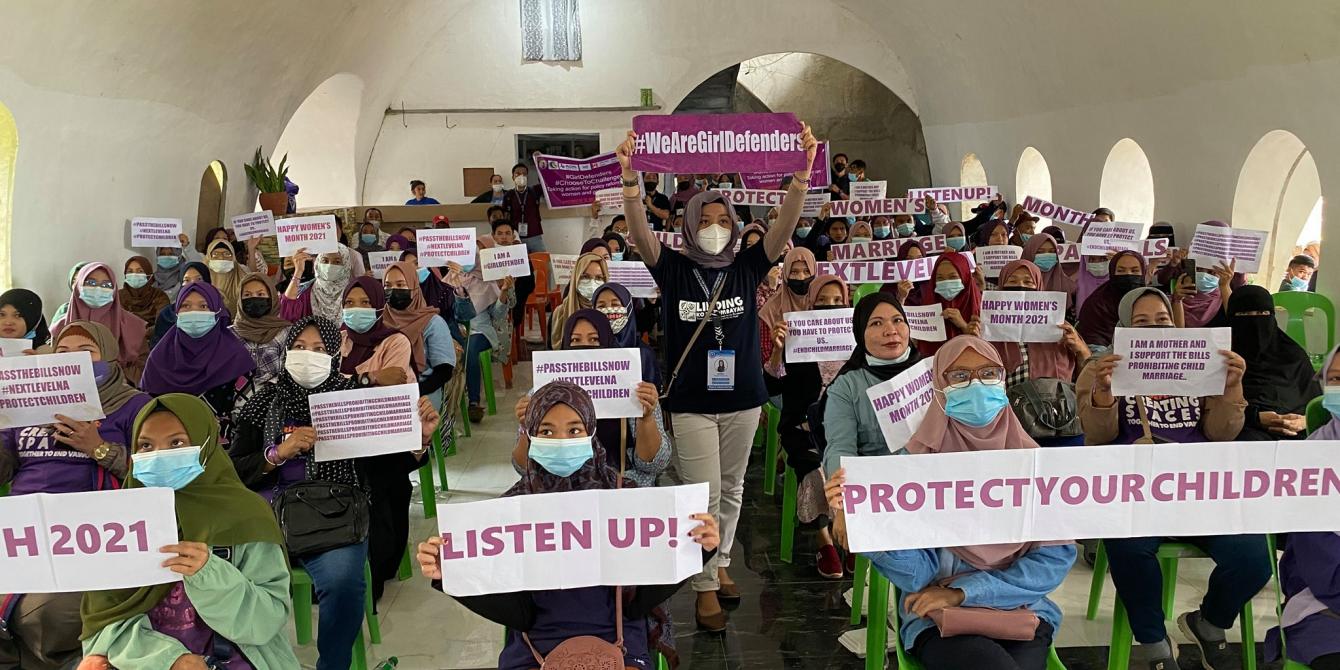‘Girl defenders’ call for urgent passage of house bill ending child marriage in the Philippines

In celebration of Women’s Month, women’s and children’s rights activists, dubbed ‘girl defenders’ across the Philippines called on the House of Representatives to immediately pass the bill prohibiting and declaring child marriage as illegal.
In a virtual rally organized by the Philippine Legislators' Committee on Population and Development (PLCPD), with support from Oxfam Philippines, members of the girl defenders alliance from various youth groups, government agencies, and women’s rights organizations reiterated the urgent need for the lower house to criminalize child marriage.
The call came at the heels of the Senate’s historic passage of the Senate Bill 1373, also known as the ‘Girls Not Brides Act’ on third and final reading last November 9.
“The Senate last year passed on third reading the bill declaring child marriage illegal. All eyes are now on the House of Representatives to bring this measure to the finish line. Join us and please reach out to your representatives in Congress so we will be able to have a law by the 18th Congress,” said PLCPD Executive Director Rom Dongeto.
Apart from the proposed ‘Girls Not Brides Act’, three other bills were filed in the House of Representatives seeking to penalize facilitators of child marriage and create mechanisms to transform harmful attitudes and stereotypes underpinning violence against young girls. These were filed by Representatives Josephine Lacson-Noel, Alfred Vargas, Bernadette Herrera-Dy, and Edcel Lagman. The bills have been referred to the Committee on the Welfare of Children and are awaiting committee deliberation.
“This measure packs a hefty legal punch. Perpetrators who participate and perform child marriage will face punishment, including fines, loss of child custody, and prison. This law, supported by education and child protection programs, will safeguard hundreds of thousands of girls and boys from being forced into marriage and give children full and equal legal protection against abuse, wherever they may be in the country. Gender equality cannot wait and, so, this law must be passed right now” Oxfam Philippines Country Director Lot Felizco said.
"We continue to call on our Gender and Development (GAD) champions, our colleagues in the House of Representatives to join us in this endeavor and expedite the passage of this law to prohibit child marriage," Philippine Commission on Women Chairperson Sandra Montano said.
There are an estimated 726,000 child brides in the Philippines, making it the 12th highest in the world in terms of absolute numbers.
While poverty and inequality are considered the top drivers of early marriage, other emerging factors significantly contribute to the increase in cases.
Human rights attorney and KILUSAN Secretary General Virginia Lacsa Suarez, who helped draft the first template bill submitted to lawmakers in 2018 , said: “Eliminating violence against women should start in eliminating violence against girls, and eliminating all the barriers in creating a better and safer space for girls. Child marriage is a social, cultural and institutional violence, thus the importance of this bill to deconstruct this violence.”
A 2019 survey by the Oxfam-led ‘Improving Availability of Reproductive Health Services in the Autonomous Region in Muslim Mindanao’ or the ARCHES Project, showed that 253 or 24 percent out of the 1,058 respondents coming from Lanao del Sur, Maguindanao, and the BaSulTa regions (Basilan, Sulu and Tawi-Tawi) were cases of child marriage, and 97 percent of them involved girls.
The 'Girl Defenders' alliance includes lawmakers; government agencies and bodies, such as the Commission on Human Rights and Philippine Commission on Women; youth campaigners from Lanao del Sur, Maguindanao, and NCR; and women's rights organizations.
The campaign is supported by the Creating Spaces Project implemented by the Al-Mujadilah Development Foundation (AMDF), United Youth of the Philippines-Women, Philippine Legislators’ Committee on Population and Development (PLCPD) and the Philippine Business for Social Progress (PBSP) with support from Oxfam.
###

 Follow us on Facebook
Follow us on Facebook Instagram
Instagram Follow us on Twitter
Follow us on Twitter LinkedIn
LinkedIn